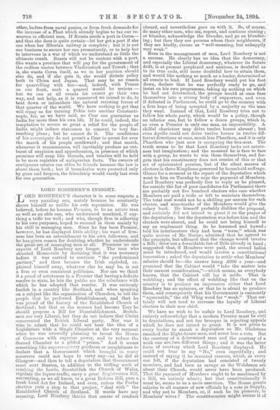GREAT BRITAIN AND RUSSIA. T HE latest story of a rapprochement
between Russia and Great Britain, which is disturbing the diplomatists of the Continent, driving the French wild with jealousy, and moving even the Germans to unwonted querulousness, seems to rest upon a very slender foundation. There has been some agreement come to about the occupation of the Pamirs, the lofty deserts 7,000 ft. high, which separate Russia in Asia from the North-Eastern limits of British Indian territory, and about which a quarrel was expected, highly gratifying to all who wish for war. The frontiers of the two Empires are to be delimited, and a No-man's- land to be marked out between them, which may be used to feed cattle in winter, and for no other purpose. At the same time the young Emperor Nicholas has, it would seem, struck up a warm friendship with his uncle by marriage, the Prince of Wales. The Prince, who is a man of the world, has been exerting himself to please his mighty nephew, has assisted conscientiously in all the funeral ceremonies, even standing, for what must have been tedious hours, with lighted candles in his hand, and has relieved by his presence and his chat the tedium of endless processions. The Czar has been gratified by the honour paid him ; he has been eager to talk to one of the few good talkers in Europe to whom he can speak on a footing of equality ; and all Europe has looked on, either with pleasure or suspicion. Lord Rosebery is credited with a grand design of detaching Russia from France, and forming a counterpoise to the Triple Alliance, and while the French and Germans murmur savagely, and even the Austrians swear that they are always helping Eng- land and get nothing in return, the Liberal Press at home pants with pleasure, and predicts a sort of Asiatic millen- nium,—the wolf lying down with the lamb, and the rabbits around them, all playing in peace. It is all quite natural, and has all occurred once or twice before during the last forty years ; but it is all, we fear, but a vision based upon nothing more solid than a dream of what might be. No one who really understands the politics of Asia can doubt for a moment the advantages 'which would follow to both Powers, and especially to this country, from an Anglo-Russian understanding. If it were only sincere and lasting, Asia, from the Bosphorus to the Gulf of Pechili, would lie helpless and quiet at the feet of the combined Powers. It would be impossible for any State in Asia to fire a shot without the written con- sent of the two Powers; impossible for any Asiatic race to remain independent for a year after they had decided that its independence should cease. Any partition, even that of China, would be easy, and each of the dominant Powers could arrange to keep up the force convenient to its own plans and its own sources of revenue. Russia could take in Persia and China enough revenue-producing terri- tory to relieve her Treasury of its heavy Asiatic burden, and Great Britain need not waste the five millions a year she is now flinging away upon the defence of her rugged and infertile mountain frontier. The human race, too, would, in a way, probably be happier. We could govern South Asia up to the Hindoo Koosh and the great spur which crosses China, very leniently and very cheaply, if we were relieved of all fear of attack ; and Russia, if she does not govern with our vivifying effect, governs infinitely better than any ruler in Central Asia, North Persia, Manchuria, or Thibet. It would be a good arrangement for the world, for at least two hundred years, if it could only be carried out ; but then there is the precise point of difficulty. The arrangement is 'worthless unless it lasts, and who is to guarantee its lasting ? It would be entirely dependent upon two factors—the goodwill of the Czar, and the con- fidence of the British people in his designs—and there is, and can be, no security for either. No Czar's life is worth a twelvemonth's purchase ; nor, as Russian necessities enfolded themselves, would we guarantee the world for twelve months against an outburst in Britain of angry suspicion and resentment. There is the true root of bitterness. Let Nicholas II.
be the best of mankind, and every Russian subordinate be sincerely Anglophil, and still the great conditions of the problem will remain unchanged. One hundred and ten millions of white men, brave, ambitious, and full of resource, are chained down on the Northern edge of half the planet, bound to live among the snows, without at any one point free access to the water, and without at any one point a subjugated province which pays, or can pay its own expenses. Vast as the dominion of the Czars is, it is a poor dominion, shut in on every side either by treaties which can hardly be broken, or by natural laws still less easy to defy. No man-of-war may leave Odessa for the Mediterranean, because of the treaties guaranteeing Turkish waters ; and for four months in the year no man-of-war can emerge from the Baltic or Archangel, or the mouth of the Obi, or Vladivos- took in the North Pacific. If the Russians were the meekest of mankind, they could not bear such a position without bitter chagrin ; and being what they are, a mighty white people with ambitions of their own, and the instinctive hunger of the North for fertility and warmth, the hunger which drove the barbarians over Rome and the Norsemen over France and Britain and Sicily and the Eastern Empire, they must press towards fertile plains and the open water. They can reach them, how- ever, only by taking either the Balkans or Asia Minor, or Persia, or Manchuria and Corea ; and would the British people, even if left secure in India and South China, be able to bear an advance which now at least they would regard as so terribly menacing P At present, Britain is ready to aid Austria in defending the Balkans, to fight herself for the neutrality of Persia, and to help either China or Japan, or both, rather than Corea should fall, and with it probably the dominion of the North Pacific, to any European Power. Would she not, if Russia pressed forward at any one or all of these points, grow wild with suspicion ; declare that the freedom of the Mediterranean was menaced ; that with Persia in Russian hands India was untenable ; or that with Russians in Port Lizareff, her prestige in the Far East, and therefore her trade, would depart for ever ? We all know that she would, and that with the first sign that the Northern avalanche was beginning to roll, Britain would strengthen her Fleet, form any alliance available, and spend millions on fortifications which, when the hour arrived, might or might not be of avail. No word of any Czar would comfort her for a moment, unless, indeed, that word ordered Russians to desist from their march ; and that is the one word which, when the Slays feel the passion on them, no Czar will ever dare to say. Emperors of Russia must, to keep their thrones, let their people go forward, and accept every now and then a great war, and by 1930, being one hundred and fifty millions and cramped for means of subsistence, the people will go forward with a rush and probably reach the goal. There is no reason during the interval why the two nations should bicker over trifles in the absurd way they do, and have done since Fox declared that the world would be lost if Astrachan were Russian; but hearty alliance between the two Powers is almost an impossibility. 'Whenever either moves, and neither will ever keep still, it will seem to the other either to be menacing its security or to be preparing to resist its advance. Kings may resist such feelings if they like, and can; but the jealousies of nations are instinctive, and, when excited, nearly irresistible by any internal power, Even set- ting aside Constantinople, that eternal cause of war, which no Russian will give up the hope of possessing, all England would be excited if Russia leased Hammerfest from Norway as was talked of only a year ago ; while if she cut her road to the Persian Gulf—a very natural way for her to the great Southern waters—our ships would hardly be re- strained even by fear of France sitting watchful and hostile upon our flank. Alliance between Great Britain and Russia, sincere alliance we mean, such as would permit both to leave approaches unguarded—England to disarm in the Himalayas, and Russia to welcome England in the Black Sea—requires a kind of goodness which the world does not possess, or at all events has never exhibited yet in international transactions. This is no reason, as we have said, why the two Powers should be eternally bickering over rubbishy details like the right to pasture cattle on the Pamirs, or expeditions for the survey of the unknown regions of Thibet ; but it is, we think, a reason why we should not help Russia either to the freedom of the Bosphorus or to a port in Corea. If the freedom must be granted, let it be granted ; but we shall never again, with Russian squadrons at one end of the Mediterranean and French squadrons at the other, be.free from naval panics, or from fresh demands for the increase of a Fleet which already begins to tax our re- sources in efficient men. If Russia needs a port in Corea- and that she does is quite certain—let her get a port if she can when her Siberian railway is complete ; but it is not our business to secure her one prematurely, or to help her to intervene in a war of which we understand so little the ultimate result. Russia will not be content with a port. She wants a province that will pay for the government of the endless wastes between Vladivostock and Tomsk ; that is, she wants Corea itself, as we in her position should also do, and if she gets it, she would dictate policy both to China and Japan. That may be no reason for quarrelling with her—and, indeed, with France on our flank, such a quarrel would be serious but we can at all events let events go their own way, and not help, as it is rumoured we intend to do, to beat down or intimidate the natural resisting forces of that quarter of the world. We have nothing to get that will repay us for turning Pekin into another Constanti- nople, for, as we have said, no Czar can guarantee us India for more than his own life. If he could, indeed, the temptation to secure so great a, relief for the people of India might induce statesmen to consent to very far- reaching plans ; but he cannot do it. The conditions of his sovereignty do not permit a Czar to arrest for ever the march of his people southward ; and that march, whenever it recommences, will inevitably produce an out- burst of suspicion and apprehension, in presence of which promises will snap like threads, and treaties will be held to be mere registers of antiquarian facts. The owners of contiguous estates can often be friends because the law is above them both ; but if boundaries were protected only by guns and keepers, the friendship would rarely last even for one generation.







































 Previous page
Previous page